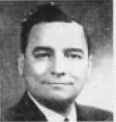This article needs additional citations for verification .(November 2020) |
| |||||||||||||||||
| |||||||||||||||||
 County results Capehart: 40-50% 50–60% 60–70% Campbell: 40-50% 50–60% | |||||||||||||||||
| |||||||||||||||||
| Elections in Indiana |
|---|
 |
The 1950 United States Senate election in Indiana took place on November 7, 1950. Incumbent Republican U.S. Senator Homer Capehart was re-elected to a second term in office, defeating Democrat Alex Campbell.

